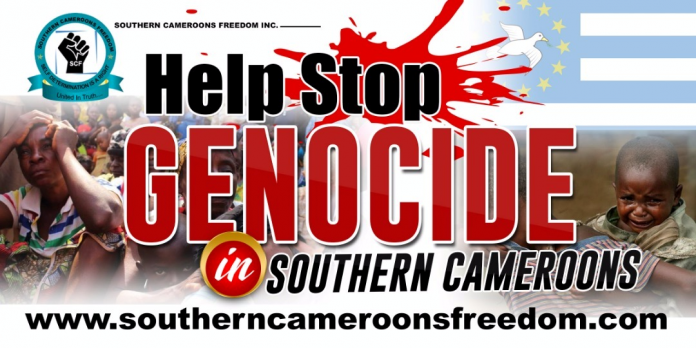Trade unions in Cameroon have affirmed their determination to defend workers’ livelihoods and work together for a peaceful resolution to the worsening crisis. At the national level, Paul Biya claims to have been re-elected president after 36 years in power in October. In the west, since 2016, the two English speaking states have descended into a spiral of marginalisation, demonstrations, human rights abuses and violence by the security forces.
Strikes, protests and demonstrations organized in the English-speaking areas against the progressive marginalization of the Anglophone minority have been violently repressed by the security forces. Government brutality has in turn spawned an armed secessionist movement. Over 7,000 people may have been killed, more than 200 villages have been burnt down, there are three million internally displaced people and 100,000 have fled to neighbouring countries, especially Nigeria.
About a third of the population of Cameroon live in the two English speaking states. The crisis exploded in October 2016 and culminated in the declaration of a separate Anglophone state, baptised Ambazonia. At independence, this area voted to join the Cameroonian federation, but this was abolished with the creation of a unitary state after a referendum in 1972.
When Paul Biya first became president in1982 (he had been prime minister from 1975) he provided signs of opening up the political space and Anglophone grievances started surfacing. But two years later the name of the country was changed. The United Republic of Cameroon reverted to the name of the French region at independence from France, the Republic of Cameroon.
Come the 1990s multipartyism and political freedoms blossomed again. English speakers were encouraged by the fact that the Social Democratic Front, the main national opposition party, was headed by the English-speaking Ni John Fru Ndi. A new constitution in 1996 promised decentralisation, but this was never implemented. Later the English-speaking legal and educational system in the West were undermined by posting Francophone Magistrates and teachers. In response, in May 2015 the lawyers sent a memorandum to the government. This was ignored so in October 2016, the lawyers called for an indefinite peaceful strike until the government addressed their grievances. The response of the government was brutal. In the full gaze of the media, lawyers were beaten and dragged on the ground.
In November 2016, teachers in English-speaking institutions also decided to down tools for an indefinite strike which lasted for three months. This was in solidarity with the lawyers and for their own grievances against French-speaking teachers being posted to their schools and universities. The teachers were also ignored, but the general public now came in to support the lawyers and teachers through demonstrations and other civil disobedience including action every Monday.
Workers employed in the private banana sector and in the diverse operations of the state-owned Cameroon Development Corporation (bananas, palm oil, tea, among other crops), which operates across the language divide, are experiencing massive job losses and the threat of worse to come as fields and infrastructure are targeted for destruction.
Workers idled by the violence received no compensation. The political crisis, transformed into a human rights crisis through the escalating violence, is developing into a massive crisis of food security and employment. In May 2016, unions organizing in the Cameroon Development Corporation called on the government to act with urgency to ensure peace and livelihood protection. There was no government response.
In June, the banana workers’ unions similarly called on the government to act, again with no response. In July, unions meeting at the network’s annual regional workshop in Abidjan, Ivory Coast, again affirmed their solidarity and the urgency of measures to restore peace and national dialogue, noting the failure of regional and international intergovernmental organizations to take appropriate action.
In January of this year, almost fifty Cameroonian opposition leaders who were political refugees in Nigeria, were holding a meeting in a hotel in Abuja when agents of the Department of State Security (DSS) swooped on them. In total disregard of all conventions on refugees, the Buhari administration delivered these opposition leaders to the government in Cameroon. The Nigerian government might have engaged in such illegality because it has a military alliance with Cameroon against the terrorist Boko Haram who are also active in north west Cameroon.
The strikes, protests and demonstrations have continued despite state repression. The struggles have escalated with the deployment of women at the frontline of the struggle especially since the massive demonstrations of September 2017, that brought an estimated one million people onto the streets. Women dressed in white or red stripped to the waist in protest. A month later protesters declared independence for Southern Cameroons (Ambazonia).
Conditions in the rest of Cameroon are no better and the minimum wage is only slightly higher than in Nigeria. Rural poverty, inadequate infrastructure and a struggling school system continue to hinder the lives of people across Cameroon, contributing to a rising poverty rate in the last 10 years. It is hoped that the protests in the English-speaking areas will encourage workers and the popular masses to actively join the struggle for a better life for all.
by Drew Povey









